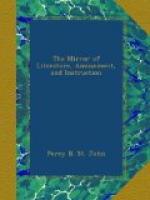To flirt with shoeless Seraphinas,
To shrink at every ruffian’s
shako;
Without a pair of shirts between us,
Morn, noon, and night to smell
tobacco;
To live my days in Gallic hovels,
Untouched by water since the
flood;
To wade through streets, where famine
grovels
In hunger, frippery, and mud.
Monthly Magazine.
* * * * *
THE SELECTOR;
AND
LITERARY NOTICES OF
NEW WORKS.
* * * * *
ART OF DRINKING WINE
The order of taking wine at dinner has not been sufficiently observed in this country. “There is,” as the immortal bard beautifully expresses it, “a reason in roasting eggs;” and if there is a rationale of eating, why should there not be a system of drinking? The red wines should always precede the white, except in the case of a French dinner, when the oysters should have a libation of Chablis, or Sauterne. I do not approve of white Hermitage with oysters. The Burgundies should follow—the purple Chambertin or odorous Romanee. A single glass of Champagne or Hock, or any other white wine, may then intervene between the Cote Rotie and Hermitage; and last, not least in our dear love, should come the cool and sweet-scented Claret. With the creams and the ices should come the Malaga, Rivesaltes, or Grenache; nor with these will Sherry or Madeira harmonize ill. Last of all, should Champagne boil up in argent foam, and be sanctified by an offering of Tokay, poured from a glass so small, that you might fancy it formed of diamond.
Literary Pocket-Book.
* * * * *
STRATFORD-ON-AVON.
I was detained at Stratford nearly two hours, and endeavoured to see whatever I could, in so short a time, relative to Shakspeare. The clean, quiet, uncommercial appearance of the town pleased me; but I was interested beyond expression on seeing the great poet’s house. When I entered the untenanted room where he first drew the breath of this world, I took off my hat with, I hope, an unaffected sentiment of homage. The walls and ceiling of this chamber are covered with names and votive inscriptions, among which I saw the signatures of Sir Walter Scott, Mr. Lockhaft, Washington Irving, and many others familiar to me, foreigners as well as English. I did not sign my name, for I felt that it had no right in such a place; but I brought away a minute relic, in the shape of a bit of rotten wood, pinched from the beam that supports the chimney.
From the birth-place of the illustrious man, I found my way to his corpse-place; and never had I beheld so beautiful and venerable a church, or so tranquil and lovely a spot. The approach to the edifice, which is situated at some distance from the town, upon the banks of the fresh and murmuring Avon, is through an avenue of lime-trees, the branches of which are interlaced archwise, as Lord Bacon would say, so as to form a green canopy of some length. The scenery is not what is called romantic, but soft and quiet, and calculated, above all things, to surround the tomb of the genial poet of human nature.




